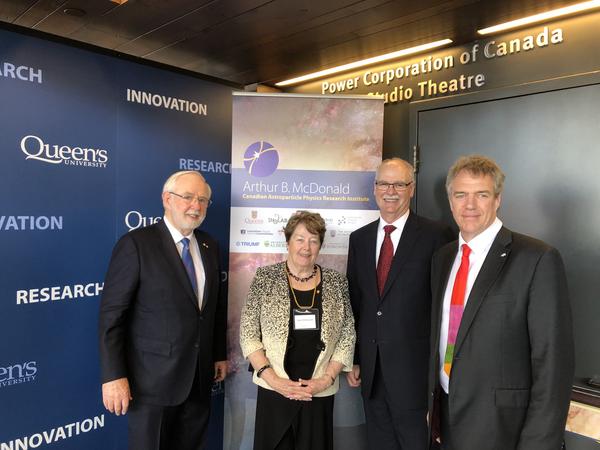SNOLAB partners in new Arthur B. McDonald Canadian Astroparticle Physics Research Institute

KINGSTON – SNOLAB is thrilled to be partnering in an incredible new astroparticle research facility with the official launch of a new national research network dedicated to understanding some of the universe’s deepest mysteries.
The new Arthur B. McDonald Canadian Astroparticle Physics Research Institute is a partnership of eight universities and five affiliated research organizations. Headquartered at Queen’s, the institute came to fruition as a result of the $63.7 million investment the university received in 2016 from the Government of Canada’s Canada First Research Excellence Fund.
“The official launch today of the Arthur B. McDonald Institute is a great step forwards for the Canadian Astroparticle Physics community, and will enhance the ability of our community to cement its globally leading role in this area of science” said Executive Director of SNOLAB, Dr. Nigel Smith. “SNOLAB is delighted to be both a key partner of the Institute and the facility which hosts many of the research projects that will benefit from this investment from the 0CFREF programme. Many congratulations to Queen’s, the Canadian Astroparticle physics community and Art on this special day for our research field.”
Over the past year and a half, the institute has been building momentum, appointing a scientific director and recruiting 13 new faculty members (out of 15 designated positions) from around the world. In total, 100 people, including faculty, staff, and students across the country will be members of the institute, all working to advance its research and outreach goals.
In addition to advancing research into areas such as the mysteries surrounding dark matter and neutrino science, the institute has a mandate for scientific outreach and to develop unique undergraduate and graduate student programing and opportunities.
“The McDonald Institute’s extensive research community and availability of funding for undergraduate and graduate students means that students will be able to contribute to the astroparticle physics community and the larger physics community as a whole,” says Liz Fletcher, Master’s Student, McDonald Institute. “By fostering of an amazing research environment across all of the McDonald Institute partner institutions, there will be an increase in opportunities for students to get involved, especially at the undergrad level, from summer positions to thesis and independent study projects.”
Along with the official launch and naming, the McDonald Institute also unveiled a new Visitor Centre located in Stirling Hall at Queen’s along with a new website. The Visitor Centre will feature a virtual reality setup that will allow guests to travel though space and experience a solar storm. The centre will also have an augmented reality sandbox that will teach guests about gravitational fields in an interactive and tactile manner.
Contact:
Samantha Kuula
Senior Communications Officer
Samantha.Kuula@snolab.ca
(705) 692-7000 x2222